
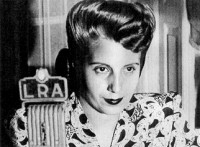
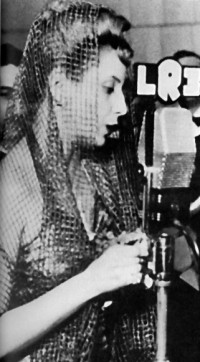
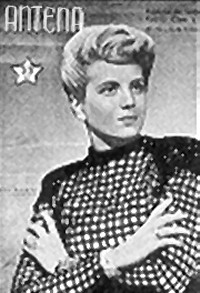
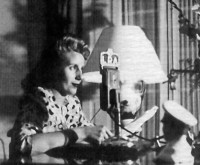
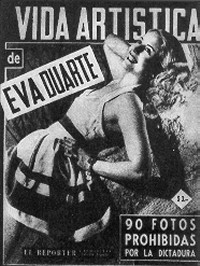
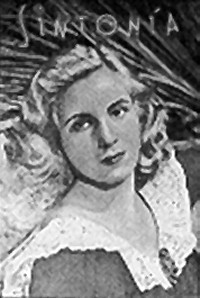





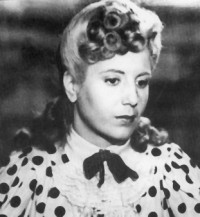
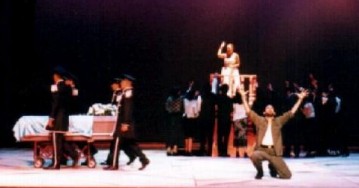
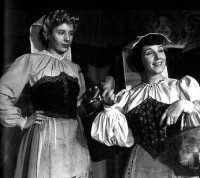
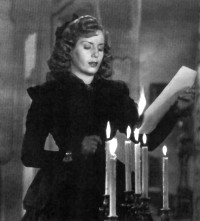
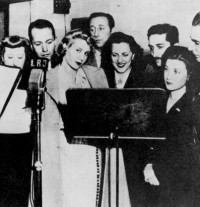
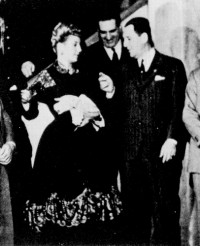
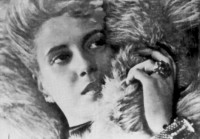
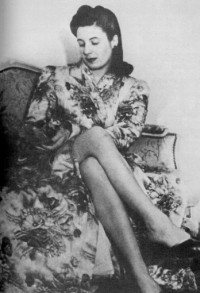
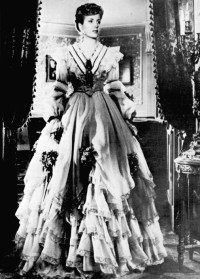
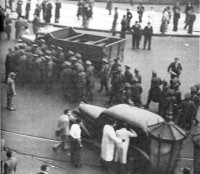
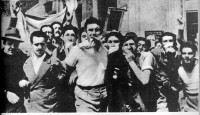
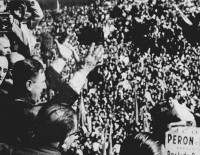
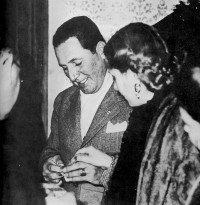

I won't go on if I'm boring you
But do you understand my point of view?
Do you like what you hear, what you see and would you be
Good for me too?
--Evita
Eva and Her Colonel
Losing the support of the upper eschelon G.O.U. men meant that Perón's campaign to win over the labor unions (and the workers they represented) was vitally important. In this, he had an unsolicited ally: Eva Duarte. Perón was good copy for her morning show, which included everything from household hints to benefits her middle and lower class listeners could expect from the new regime. Colonel Perón was often singled out for special praise because of his pro-union legislation.
Eva's instinct for ways to make her work acceptable to the new power group was flawless. It is not really important to know whether or not Eva agreed with either Perón's or the Ramirez governmentsí policies. She supported them publicly because that was the only way to ensure the perpetuity of her job and new-found security. We will never know whether she would have allied her loyalties with any group which could have been in power at the time, but after so many years of deprivation, sufficient food, clothing, entertainment, and housing must have seemed worth more than political convictions. Nevertheless, the nature of Perónís growing political philosophy must have appealed to Eva. She was witnessing the work of someone who offered to move the working class (including herself) into the national spotlight after four centuries of obscurity.
Colonel Perón and Eva Duarte had not met but they had already become useful to each other. Thus was the stage set for their first encounter, which took place at the beginning of 1944.
There have been many conflicting stories about the time and place of their meeting but it is reasonably certain that they met at a rally in Luna Park boxing arena held in aid of the victims of an earthquake in the provincial town of San Juan on 15 January. It is possible that Eva met Juan as early as October 1943, but there is no certainty of any of the stories.
Once they met, only death would separate them. Most sources agree that they immediately went off for a short holiday to one of the resorts on an island in the River Tigre and then began to live together in Perón's Campo de Mayo officers' quarters. Soon, they acquired an ajoining apartment to Eva's on Calle Posadas, and behaved more like an old married couple than a pair of young lovers, testifying to their mutual compatibility. They were open about the relationship (and this created a very real scandal among Perón's brother officers) but there was more between them than pure physical attraction; they formed an alliance that went well beyond the bedroom, with complete participation in each others' lives and daily activities.
Eva and the Army
Eva Duarte had become quite well-known as a radio personality by 1944. On her current events program, Hacio un futuro mejor (Towards a Better Future), she may not have shown all the charisma and star quality sheíd have later, but the beginnings of Evaís unique touch with the common man were in already in evidence.
Her program was aimed at the working class, and her country philosophy and rough speech were very popular, and she often told of the great things the new government was doing for the people. The show was aimed at housewives and laborers relaxing after their evening meal; she told them that previous regimes had exploited them, ignored them, and their lives had been miserable. The point was, of course, that the revolution had brought change. The emphasis was on raising her audienceís self-esteem and encouraging upwards mobility, a pretty novel idea in Argentina.
Eva and her colonel were often in the local press, she in the entertainment magazines and he in the daily reports of government activity. But their names were only linked in one or two radio fan magazines, since it was the custom of the chivalrous Argentine press corps to take no public notice of a man's mistress. However, Time magazine in North America did note in 1944 that Perón was often seen around town with "a charming movie star named Eva Duarte."
However, their relationship was common knowledge in both the entertainment and military circles. Evaís career began to advance just as swiftly as did her loverís and between 1943 and 1945, her salary rose from around $45 a month to over $4,000 a week. It was obvious by this time that Eva had picked a winner...but then, so had Perón.
The distance separating Perón and his fellow G.O.U. officers grew as the months passed. He was only peripherally affected during a serious diplomatic crisis that nearly toppled the revolutionary government in January 1944. The top secret arms mission to Berlin the previous October had ended in disaster and the British were in possession of documents which incriminated Ramírez and his associates. Simultaneously, the United States discovered evidence of Argentine involvement in the December 20 rightist coup in Bolivia which made a mockery of Argentina's avowed "neutralist" position. This massing of pressure from Allied powers finally forced Ramírez to break diplomatic relations with Japan and Germany.
The G.O.U. was shocked, and tried to convince Ramírez to back down. He could not, but he never explained why he had made the decision when he did, so the furious colonels eased Ramírez out of office, replacing him with Perón's boss. Edelmiro J. Farrell. This was such a minor reshuffling and the U.S. still felt the government was so riddled with Axis sympathizers that it broke off diplomatic relations with Argentina in early March. Perón moved into the now-vacant Minister of War post, and his chief rival, González, was discredited and ousted. The G.O.U. disbanded to avoid placing its membership in compromising positions due to the oaths of aliegance to Ramírez they had signed.
The organization was not entirely dead, however, because Perón continued to court the junior officers, feeling that such a power base was too good to lose. These men signed new loyalty pledges...to him.
This astute use of an opportunity was characteristic of Perón, who was usually one jump ahead of his opposition, and one step ahead of his cohorts. He flattered these young men with his attention and understanding of their problems, and backed up his friendship with concrete action: he issued a decree which totally remodeled the army, much to the advantage of the younger men.
The organization of the army had not been altered since 1915, and much of its structure was based upon outmoded ideas and needs. Rearmament was a first priority, but was impossible at this time, due to the failure of the arms mission to Berlin (and relations with the U.S. were more strained that at any other time during the war). Perón's October 1944 statute reduced the time needed in each rank for promotion; expanded upper eschelon ranks made room for the faster promotion schedule; forced retirement policies were abandoned (a conciliatory gesture to the older men); higher salaries, low interest home loans, and other perquisites were also included.
Eva participated in many of Perónís political maneuverings, since much of the planning had to be done at home, away from prying eyes and ears. Perón had an informal "kitchen cabinet" which met regularly at the Calle Posadas apartment. The couple could not have had much time alone together with the constant presence of groups from labor or the military, so Eva joined in his work, impressing him (if no one else) with her natural aptitude for politics.
Her work on the radio made her an experienced propagandist, as well as developing a style that was unique. And as for her relationship with Perón, she knew that it was unheard-of in Argentina for a man to marry his mistress, so she set out to become a companion, political ally and sounding board. She went to union metings, and even some formal military functions, causing some raised eyebrows among the wives of the other officers.
Struggling for Power
Perón was appointed to the office of vice president in July 1945, but it was a bitter fight, and he worked even harder to gain the loyalty of as many officers as possible by manipulating assignments, retirements and promotions and was reasonably successful at neutralizing his foes and rewarding his pals. This was valuable training in the diplomacy he would need if he became president, but he denied that he had any such idea at the time.
The first women's Division of Labor and Assistance was created by Perón in October 1944. This was the beginning of Perón's campaign to integrate women more fully into Argentine life and Eva became his most valuable asset in his work with organized labor.
Perónís two-step from the army to labor and back again was well-planned, effective and vital to his political survival. In a juggling act which would eventually be crystalized into his smoke-and-mirrors political philosophy --justicialismo--he forced two groups with nothing in common to both become dependent on his survival in high office. Each group was also used as a potential threat to the other.
In January 1945, Perón did as much for labor as heíd just done for the military--he decreed paid holidays and annual vacations for all workers in organized labor. A centralized labor organization was Perón's goal, and he began this task by contacting the leaders of every individual and independent union. He would usually seek the strongest union in each industry, recruit its leaders, and then eliminate all rival organizations. These men had risen from the lower class or were immigrants, and they were brave, loyal, and resourceful. Many were to become Perón's staunchest supporters, and they were also less reluctant to accept Eva's presence in their midst than Perón's other support groups.
On the Air
Eva's star had risen as high as her lover's. Radio Belgrano's owner, Jaime Yankelevich, was astute enough to give her a fabulous raise after a photo of her on Perón's arm was published in the radio logs.
She did a little politiking of her own that winter (it must be remembered that the seasons in the southern hemisphere are the reverse of those in the north) when she organized and was elected president of the first radio performer's union. La cabalgata del circo ("Circus Cavalcade") began filming in May, and it was Eva's first starring role in the cinema. Perón's influence insured that Eva received star treatment on the set, despite the much greater popularity of her co-stars, Libertad LaMarque and Hugo del Carril. Eva began to throw her weight around, causing some friction on the set, which has always been cited as the cause of Libertad's departure to make films in Mexico City. However, del Carril, a well-known tango singer and film star, remained one of Eva's close friends for the rest of her life, and he was allowed a latitude in his career denied nearly everyone else in the country.
Eva was still doing her monthly series on famous women, playing Alexandra of Russia, Sarah Bernhardt, Isabel of England, Margarita Weil de Paz, and others during 1944. This intense work schedule proved to be more than Eva's physical stamina could endure, and she had a breakdown in September, forcing her to take a month off.
Perón--Go Home!
Argentine foreign relations were at a boiling point in early 1945. Perón had done well to disassociate himself with the other colonels in the government, as many of them were pro-Axis and seriously embarrased when Argentina finally accepted the obvious and declared war on Japan and Germany in March. Fearing reprisals from Germanophile citizens, the government forbade all public gatherings, and dealt harshly with spontaneous groups celebrating the liberation of Paris (cultural home to many Argentines) and the defeat of Japan. The police brutality was so severe, it is hard to imagine that pro-German citizens would have done worse damage. Repression was the order of the day.
Perón engineered a price freeze and rollbacks to 1944 levels and the decree triggered organized opposition from a large group of businessmen. Also in May, Perón was discredited among his military cohorts when his deal for lend-lease armaments from the U.S. was cancelled by newly appointed American ambassador Spruille Braden. Instead of letting these setbacks deter him, Perón turned them into positive political forces: he lumped his adversaries together: the U.S., the socialists, and the communists, and portrayed them as a threat to both his support groups, the army and labor.
However, the generals were uneasy, and serious attempts to oust Perón began in late July. Perón immediately placed three recently recruited Radicals into cabinet posts in order to broaden his stance, and this pleased the U.S. to some degree and quieted the generals, who saw another possibility for arms. The general citizenry was not so easily pacified, though the state of siege was lifted in August. Over 230,000 porteños from all walks of life joined in a mass rally in the Plaza Francia. This "March of the Constitution and Liberty" was intended to pave the way for military intervention to oust Farrel and Perón, but the generals wavered and dawdled, and no one really emerged with a unified plan. Finally, General Rawson (the two-day president in 1943) staged a coup on September 24, but was immediately defeated. The state of siege was reimposed.
After endless discussion, the Campo de Mayo generals and the commanders of the war academy were moved to act because of one of Perón's political appointments--a friend of Eva's from the days of seeking approvals for her radio scripts--Oscar Nicolini, was given the coveted post of secretary of communications. The job had been promised to a Campo de Mayo lieutenant, and General Avalos and the others could not have objected more violently had Perón given Eva herself the job. Actually, that was exactly what he had done, and it gave the army officers a way to vent their long-simmering hatred of Eva. Perón's indifference to army codes of discretion and gentlemanly behavior, plus Eva's agressive personality and overt familiarity with the stuffy military men had infuriated them. Avalos said, twenty years later, that the Duarte/Perón liason was "something which annoyed us very much, to such an extent that perhaps few can understand it today." Their reaction can perhaps be explained solely in terms of Argentine machismo, but her visibility was not an asset so far as Perón's colleagues were concerned.
Eva had started filming a new movie in February. She chose an odd vehicle for her first top-billed feature. La pródiga ("The Spendthrift") was about a middle-aged wealthy woman, and she was seriously mis-cast in this costume epic. However, she is much more effective than in her earlier roles, and has a definite air of maturity and sophistication, enhanced by her blossoming beauty. She was just 25, and production was sporadic because of her active political life. Perón visited the set frequently, often bringing the raw film stock with him which he obtained through the government. This allowed Eva a great deal of "artistic freedom."
Defeat, Triumph and the Descamisados
The violent reactions of the military indicate just how great Eva's participation in Perón's life was by this time. In fact, she cost him his jobs...all three of them.
General Eduardo J. Avalos became the reluctant leader of the army's move to stop Perón. The commandant of the Campo de Mayo, he was chosen by default to be the one to demand Perón's resignation. They had known each other for some time, so Avalos went to the Calle Posadas apartment and tried to accomplish his task at an informal meeting. Perón refused, so a four-man delegation set out for the Casa Rosada on the afternoon of October 9. After a brief conference with Farrell, Perón was induced to resign from his posts as vice president, minister of war, and secretary of labor.
Avalos and company, considering they were military strategists, made so many mistakes in the next few days that they actually furthered Perón's cause. They had evidently made no plans about how to handle the situation, and their first error was to replace Perón's personal henchman and chief of the federal police, Colonel J. Filomeno Velazco, with another peronista, Colonel Mittelbach.
Unbelievably, they also neglected to get Perón out of circulation, and he was running around town gathering his supporters, giving speeches, and holding press conferences. Jaime Yankelevich was not so slow; he fired Eva from Radio Belgrano even though she was in the middle of a series.
Rumors started to fly that Perón might be arrested shortly, so he and Eva, her brother, his long-time friends Domingo Mercante, Rodolfo Freude, and Román Subiza, all left the city, headed for Subiza's apartment. The couple changed their minds and went to Freude's fatherís cabin on an island in the Tigre Delta area, leaving the others on shore. The issuance of a warrant for Perón's arrest on the 12th caused Mercante to call Chief Mittlebach and tell him where Perón was, and the federal police collected the couple, took them back to their apartment, and then took Peron to the prison island of Martín García.
In a decree the previous January, Perón had made October 12th a legal holiday (celebrated in Argentina as "The Day of the Race," it marks Columbus's discovery of America), but the moment he was forced out of office, many employers cancelled the paid holiday. The workers were incensed and called for a general strike. Meanwhile, Perón wrote letters to Farrell, his supporters, and Eva. He complained that he didn't know what was going on, griped about the weather, gave Eva legal instructions, and asked to be allowed to go into exile. Though Eva would later say that Perón wrote her no words of love during his imprisonment, the letter which has survived is certainly a love letter. Perón tells her who to contact to arrange for their exile, tells her which friends can be trusted, and says he will marry her immediately after his release, that they will be happy wherever they are. Eva's mood during her lover's period of exile is obvious: Perón reminds her three times to be "calm and tranquil."
Evidently, Eva was anything but calm and tranquil, but it is doubtful that she spent the whole time in frenzied activity as she would write later, "Thus I went from door to door. In that painful and incessant walking, I felt the flame of his fire burning in my heart, consuming my utter smallness."
Recently, Eva's role in the events following Perón's arrest has been carefully scrutinized. Marysa Navarro thoroughly analyzed the pro- and anti-Peronist literature as well as contemporary reports, and said, "the only possible conclusion that can be drawn from the sources available at present is that Evita did not play a relevant role in the October 1945 crisis."
Perón's support group was led by Cipriano Reyes, leader of the laborista party and boss of the meat-packers union; Luís Gay, head of the federated telephone workers; Angel Perelman of the metallurgists union; Lieutenant Colonel Domingo Mercante (whose nephew stepped in when his uncle was arrested on the 13th), and other military and union men. Perón's staff at the Secretariat of Labor was intact and also provided a base of operations.
Eva's part in this group was first challenged by Felix Luna in his record of this year, El 45. He says that Eva could not have rallied anyone to Perónís defense because she was only an actress and no one would have listened to her. However, a contemporary witness says, "of course she was involved. She was Perón's mistress, and, as such. would have spoken for him among the men who knew of her participation in his affairs. They would have listened to her, no doubt about it. She was very important to 17 October."
Eva's motivations are easy to guess; she obviously did not want to lose the power and position she had gained with Perón, but she also owed him something. It was the appointment of her friend which had triggered the crisis. She did everything she could think of to get Perón released. What will never be known is how effective those actions were in the overall picture of the events of those five days.
On the afternoon of Perón's arrest, Avalos finally threw out the pro-Perón cabinet, making the workers feel that their voice in government was gone forever. They gladly listened to Reyes, Gay, and the others who incited them further. The central committee of the Confederacion General del Trabajo (the General Confederation of Work--the most powerful group of centralized trade unions) met to plan a general strike for 18 October. However, the laborers were so excited that sporadic demonstrations began in the meat packing plants as early as the night of the fifteenth, unhampered by the police, who were either reluctant to take sides or still loyal to Perón's man Velazco. Little effort was made to stop the strikes, and the government refused to believe the situation was serious. Finally, on the sixteenth, Avalos yielded to public pressure and made an announcement that Perón was not under arrest, but only "in safekeeping, to prevent harm to his person." That night the CGT committee formally announced the general strike and let everyone know that preliminary wildcat strikes and rioting were encouraged, should the members not be able to contain themselves until the 18th.
By the morning of October 17th, there were more than 20,000 workers in the Plaza de Mayo and another large group had siezed the entire industrial section of the capital. Meanwhile, Perón had used his friend, physician Miguel A. Mazza, to convince Farrell that he was ill with pleurisy, and he was transferred from Martín García island to a military hospital in Buenos Aires.
The commandants at the Campo de Mayo garrison had been waiting for two days for orders to march so that they could put down the rebellion, but Avalos had visions of thousands of civilian casualties and would not give the order. The generals were loyal, and obeyed, taking no action themselves.
Avalos and Farrell spent most of the 17th closeted together, and by early afternoon there was a continuous stream of messengers running between the Casa Rosada and Perón's hospital room. Farrell went to see him at about four o'clock, and agreed to Perón's demands: a partisan cabinet and a rubber stamp for all legislation Perón wanted to put forward. A ludicrous footnote to the mis-handling of the Avalos leadership came shortly after this, when lawyer Juan Alvaraz, whom Avalos had asked to form a cabinet of distinguished civilians on the thirteenth, announced that he had finally come up with one.
From ignominious arrest and loss of all power, Juan Perón was given a country to run while holding no single office in its government. He also resigned his army commission, a move which pleased the workers immensely, and he caused a near riot when he appeared on the Casa Rosada balcony with Farrell late that night. He spoke briefly, and took off his jacket--a gesture which became a cherished peronista ritual. Perón, the descamisado. His presidential candidacy assured, Perón was able to turn to some unfinished business, and married Eva.
Go to: Chapter 3. DOÑA MARÍA EVA DUARTE DE PERÓN (1946-1947)
Bibliography
Design © 1999
Text© 1980, 1999 by Sylvia Stoddard